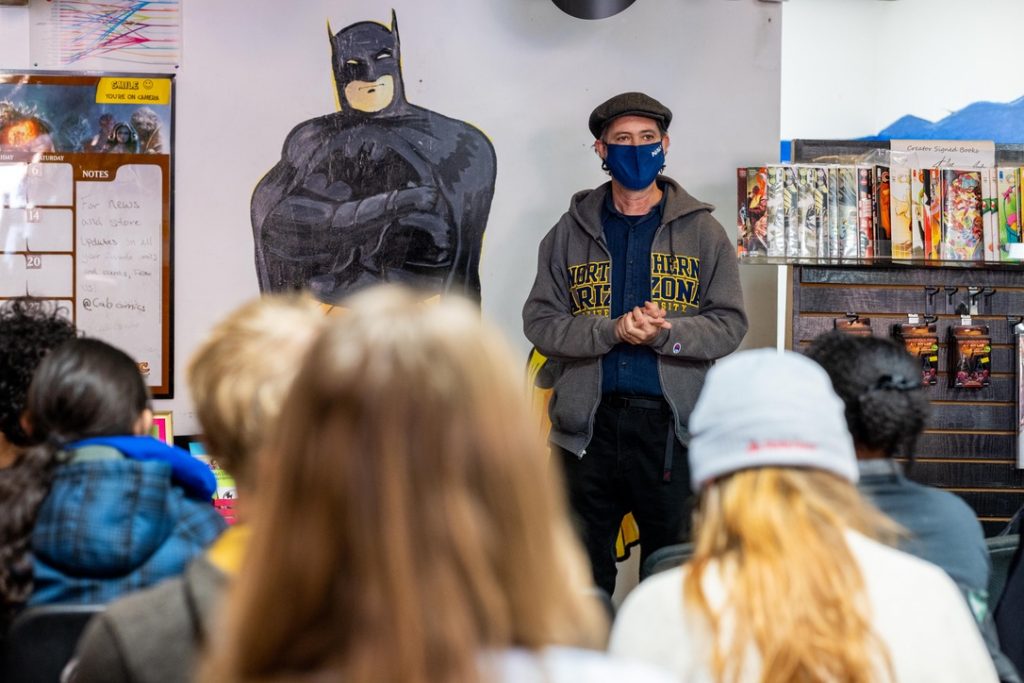Finding a career path that fit all of Robert Wallace’s interests—music, writing, art, mentoring, poetry, nature, comic books, world events, getting to be creative, making each day unique—seemed like a unicorn. He found it, though—or built it—as a teaching professor in the Honors College. He talked to The NAU Review about his work as a teacher, writer and musician, why he loves being a teacher and how pivotal the San Francisco Peaks have been in his life, particularly in his younger years.
What brought you to NAU?
The short answer is that I got a job in the Honors College in 2016 (at the time it was still called the Honors Program). The longer answer is: my wife, Kara Attrep, who now also teaches in Honors, said that I should apply for the job. We had been living and working all around North America for years, but we both have roots in Flagstaff: I was born and raised here, and she is a graduate of NAU. We had applied to various jobs in Arizona and in the West more generally, but we finally ended back up where we started!
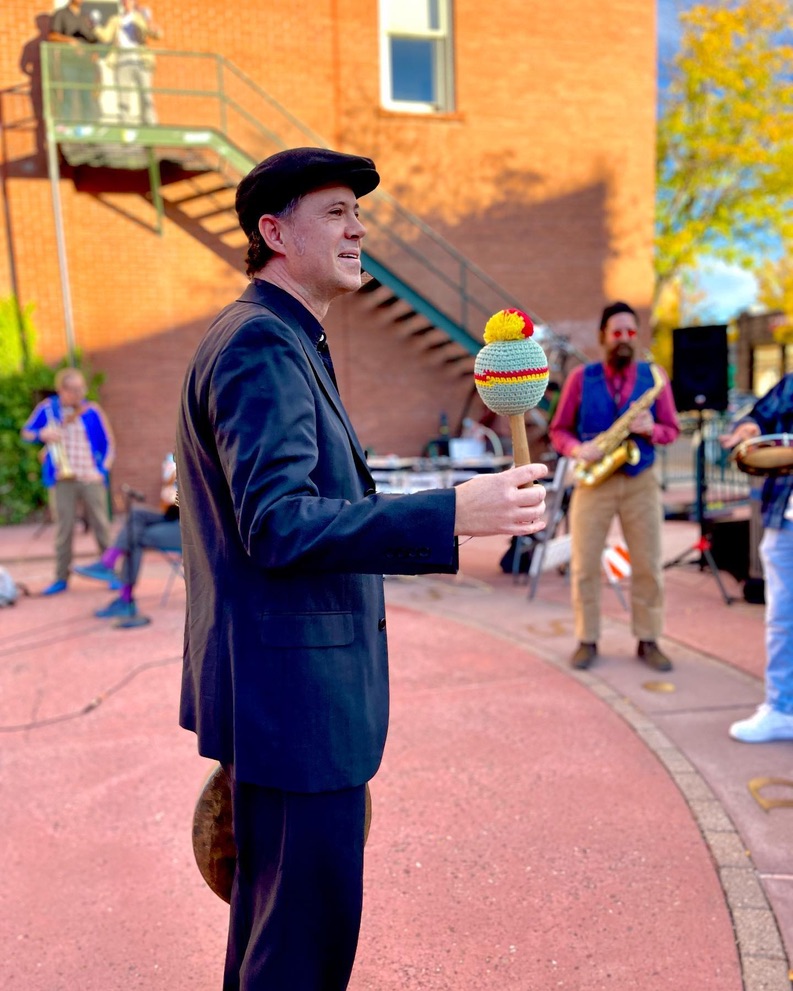
What does a day in the life of your work look like?
On days where I am on campus, I usually teach three to four courses and meet with various colleagues and students. When I get home, I also typically practice various percussion instruments (most frequently tabla, a set of drums from North India, and drumset), and plan events for the experimental/improvised music series I co-curate, the Interference Series (writing grants, answering emails, reaching out to new artists, etc.). And I am always reading, grading papers, listening to music and hanging out with my son, Sam, who is hilarious and amazing.
What’s your favorite part of being in the Honors College?
Honors is the only place where I have actually been paid to do the strange mix of things that I have a background in: teaching literature and writing-based courses, mentoring students on various projects and also teaching topics-based courses on a variety of subjects from jazz history to comic books to globalization theory. Additionally, I teach an ensemble course focused on improvisation and experimental/intermedia arts, and I love collaborating with local and visiting artists and scholars to engage with NAU and the greater Flagstaff community. In the morning I might be teaching students how to craft a thesis statement for an essay on Maxine Hong Kingston, and later the same day those same students might attend a reading by a visiting author like Willy Vlautin, collaborate in a concert of experimental music with Japanese percussionist Tatsuya Nakatani or interact with local punk legends Sihasin.
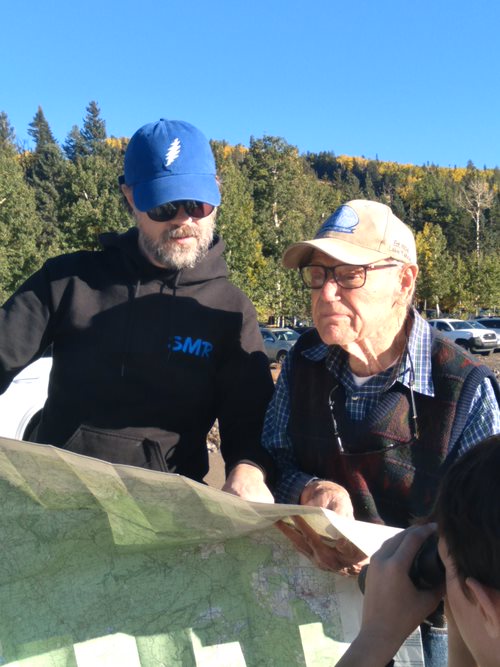
Tell me about your work as a writer and musician. How did you get into those media, and how do you engage in them today?
I am active as a percussionist (mainly on drumset) and as a writer (mainly of poetry and texts oriented toward performance). I have recorded, performed and published widely, and my latest project, Humdrum, is a forthcoming book and recording of original texts and music devoted to voice and percussion. My mother was an elementary school English teacher (although she had stopped teaching long before I was born), and my father was a history professor (here at NAU—he is still doing research and writing articles at age 93!). My mom also played piano and sang in choirs. We didn’t have a TV for much of my childhood, so I entertained myself by reading and writing and eventually by learning how to play music. My older sisters listened to a lot of what is now “classic” rock and pop music, and my parents listened to a bit of everything. I really learned to play jazz drumset by getting to sit in on a weekly basis with NAU jazz students and faculty at Charly’s, back in the early ‘90s. And people like Jim Simmerman, a poet who taught at NAU, made me realize that writers of great quality could be in your own backyard.
I also had a wonderful set of teachers in the public schools here—I’d be remiss if I didn’t at least mention Linda Besnette, Kathi Baron and Dee Chadwick (among many, many other excellent teachers!). So even though many people still relegate Flagstaff to a kind of backwater/small-town status, I never felt like I was missing out on things culturally or environmentally—the rich natural and cultural landscape here was formative to what I do now, and I am humbled by the fact that I get to give back to the community I grew up in. I am constantly amazed at how complex and profound this place is, from the complicated interactions between various cultures as a result of imperialism/colonialism in the Southwest, to the fascinating natural history of the Colorado Plateau—all of these elements influenced and enriched my interest in writing, history and the arts more generally. I am really still learning how to play music, and I get to regularly collaborate with fantastic local musicians like Owen Davis (the founder and co-curator of the Interference Series), my wife and other colleagues at NAU and my friends and neighbors in Summit Dub Squad, the F-Town Sound and other projects that I play with. I have also learned from and been profoundly rewarded by my collaborations with students. And writing … well, I’m still working on how to write at least one good poem.
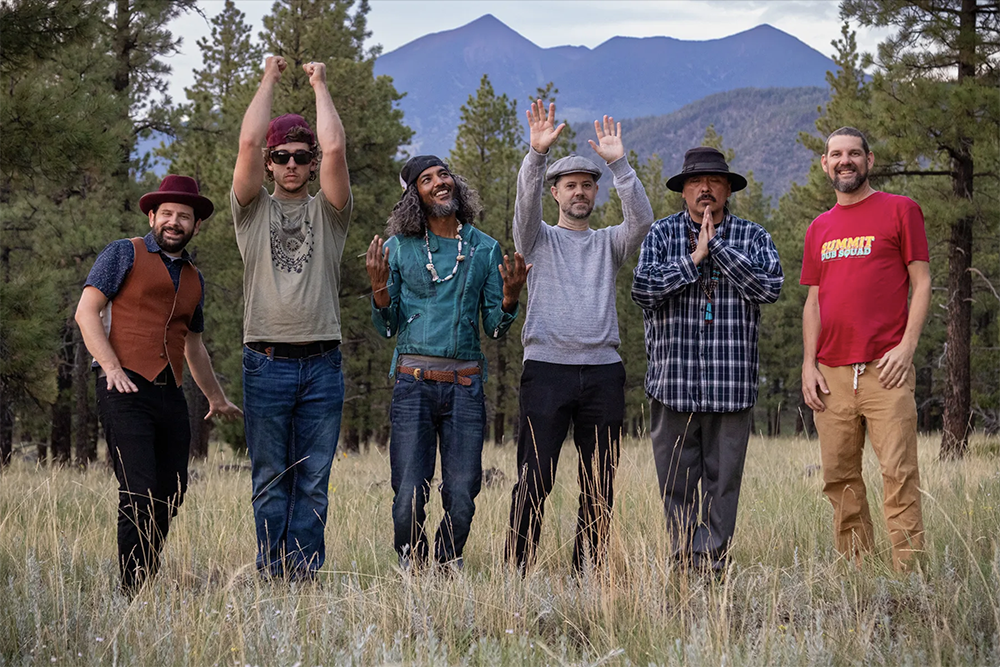
Tell me about a significant childhood memory and how it has impacted your life today.
Rather than a specific memory, I have to say that the image of the San Francisco Peaks really sticks in my mind as a formative vision. My childhood bedroom window looked right out on the classic, south-facing side of the mountain, with the distinctive set of almost perfect triangles. It’s easy to see why this is a sacred sight/site—it’s such an iconic and sublime combination of lines and shapes. I feel lucky that I can see that image every day, and I am grateful that I get to live in its shadow.
What did you want to be when you grew up?
While I don’t think I ever imagined I’d be a teacher, per se (probably due to the still-prominent anti-teacher/anti-intellectual culture we live in), I always thought that my dad’s job looked pretty good—and it turns out that basically all of my immediate family members have been teachers at one point or another. But the great thing about my teaching gig now is that I can also be the things I dreamed of: a writer and a musician. Those activities inform, and are influenced by, my teaching. If there’s one thing that has become most important to me as a teacher, it’s the idea that students should try to be creative humans no matter what their “job” is. Being a teacher, as well as being a teacher who frequently teaches about the arts, has allowed me to model that, to at least a small degree.
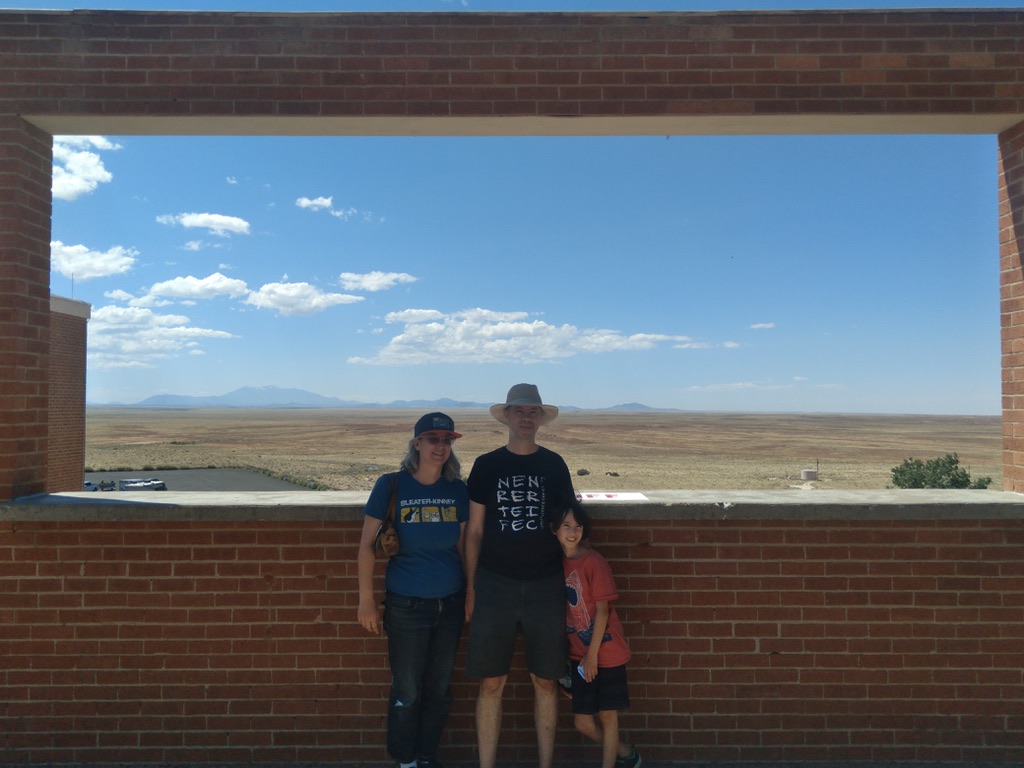
What is your favorite way to spend a day off?
Hanging out with my family and friends, listening to and playing music, reading, enjoying our natural environment and traveling!
What are three things on your bucket list?
Traveling to all of the continents (so far I’ve only been to Asia and North America), composing and performing music for a medium/large ensemble and leaving the world better than when I showed up!
Top photo: Wallace and Batman mural at Cab Comics; Honors College course meeting for Comic Books & Other Intermedia course 2022 featuring guest writer/artist J. Gonzo. Credit Stephan Tafoya.
